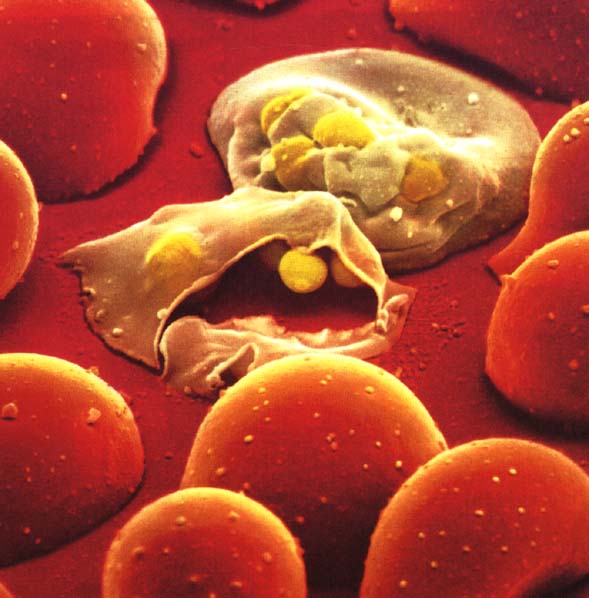
I would like to add a few more details to the response above. Intermittent Prevetive Treatment for pregnant women (IPTp) is especially relevant for women who have lived and continue to live in areas with malaria. they generally have been exposed to malaria before, and in many cases malaria has been detected in their placentas, but they can be completely asymptomatic (i.e. they have no symptoms) of malaria like fever etc. Researchers found that giving a course of an antimalarial treatment at specified time points, reduced maternal anaemia and the likelihood of having a low birth weight baby.
The recommended schedule for IPT in pregnant women is as follows:
SP shall be given as single adult dose (3 tablets of 500mg Sulphadoxineand 25mg Pyrimethamine each) at scheduled antenatal care visits during the second and third trimesters.
The two doses of SP shall be given at least one month apart.1st. Dose: at the first antenatal visit after quickening (first fetal movement – from sixteen weeks)2nd. Dose: at least one month after the first dose.
NOTE: HIV positive pregnant women shall receive at least 3 doses of SP instead of two doses (subsequent doses shall be given at least one month apart).
As the editor mentioned, IPT is also recommended by WHO, UNICEF and other international organizations. the following is an explanation of IPT in infants.
What is Intermittent Preventive Treatment of malaria in infants (IPTi)?
IPTi is the administration of an antimalarial drug at the time of childhood vaccinations in the first year of life and takes advantage of delivery alongside the well functioning WHO Expanded Programme for Immunisation (EPI). under this approach, infants receive an anti-malarial drug two or three times during the first year of life whether or not they have malaria and are provided with prophylactic protection for the duration the anti-malaria drug is present in the blood.
Why IPTi instead of chemoprophylaxis?
Continuous chemoprophylaxis in young children reduces malaria morbidity during the period of prophylaxis, however following the cessation of prophylaxis, a rebound of malaria was noted in the treatment group (Greenwood 1995, Menendez 1997), even though it is uncertain whether these children actually experienced more malaria than the children that received placebo when the whole period at risk was taken into account. Menendez et al gave weekly chemoprophylaxis to infants from 2 to 12 months of age which provided 60% protective efficacy against clinical malaria, however these children then experienced almost double the level of clinical malaria than the placebo group when the prophylaxis was stopped. when the children were followed up to 4 years of age the amount of malaria experienced by the two groups was similar (Aponte 2007). Due to the concern of a rebound in malaria, and because of the major logistic challenges involved in delivering weekly prophylaxis, and fears that large-scale drug use would hasten the spread of drug resistance, implementation did not occur in endemic countries.
How has Intermittent Preventive Treatment (IPT) developed as a treatment?
Continuous chemoprophylaxis was recommended for pregnant women to decrease the deleterious affects of malaria during pregnancy such as maternal anaemia resulting in low birth weight babies vulnerable to other infections. however, problems of delivery of the anti-malarial drug and compliance of the woman taking the anti-malarial drug on a regular basis greatly reduced the effectiveness of this strategy. however, high levels of African women visit antenatal clinics during their pregnancy and it was demonstrated that, delivery of a full course of an antimalarial treatment at specified time points regardless of the presence of parasites, reduced maternal anaemia and the likelihood of having a low birth weight baby – and the WHO recommends the use of IPT in pregnancy (IPTp) for malaria control.
With the success in preventing malaria morbidity using IPTp, it was decided to investigate IPT in infants (IPTi), taking advantage of the regular contacts that babies have with the clinic in the first year of life when their caregivers bring them in to receive vaccinationas delievered through the WHO’s Expanded Programme for Immunisation (EPI).
First results for IPTi:A study conducted in Ifakara, Tanzania of IPTi with sulfadoxine-pyrimethamine (SP), delivered at the time of the second and third doses of Diptheria-Tetanus-Pertussis/Oral Poliovirus Vaccine (DTP/OPV) and measles vaccination, at approximately 2, 3 and 9 months of age resulted in a 59% reduction in the incidence of clinical malaria and a 50% reduction in the incidence of severe anaemia (a PCV < 25%) in the first year of life (Schellenberg et al Lancet 2001). Infants who received IPTi-SP were also less likely to present as outpatients with fever and less likely to be admitted. Safety monitoring suggested no adverse consequences of IPTi-SP and serological analysis of the response to routine vaccinations was also reassuring. Infants who received IPTi-SP also had 36% less malaria in the second year of life (Schellenberg et al Lancet 2005).
Like or Dislike: 0 0